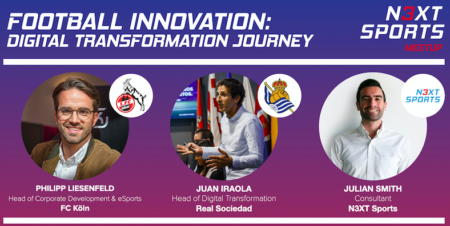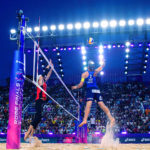
Time and again we’re hearing the same narrative among our community of industry experts, clients, and partners: digital transformation is a necessary enabler of success and no longer a “nice to have” element of your work.
On May 20th we had the privilege of hosting Juan Iraola, Head of Digital Transformation at Real Sociedad, and Philipp Liesenfeld, Head of Corporate Development & Esports at F.C Köln, two leaders of two top-flight European football clubs who provided perspective and advice on all things digital in football.
Digitalization as a must process
The justification on why to begin the journey of digital transformation can vary; from adapting your business model to changes in the corporate strategy. For Real Sociedad, a new stadium presented increased engagement opportunities, and integrating digital efforts in the overall strategy was key. Building a digital-based loyalty program increased Real Sociedad membership, a new ticketing solution sold more tickets, and ultimately both initiatives brought fans closer to the club. The initiative began in early 2016, and took some years to come to fruition, but the dedication clearly paid off.
F.C. Köln recognized changing tides ahead and saw a need to adapt
“When we looked at our current business models in the digital era, we felt we need to change something or prepare for a future where these business models won’t work anymore.”
F.C. Köln was attuned to changing consumption and sponsorship behavior and proactively took steps to remain competitive as the landscape changed.
This all sounds great, but the challenge for sporting organizations is the lack of expertise on designing and implementing digital solutions. Football clubs, for example, traditionally do not have the appropriate infrastructure, culture, and knowledge to take the step towards digitalization. Another inhibitor to unlocking digital success is an inherent aversion to investing effort and resources into building a digital strategy; but our panelists agreed that the rewards this produces far outweigh the initial costs, and are not limited to being financial in nature. This is especially impactful if a purpose is defined from the very beginning, as was done both at F.C. Köln and Real Sociedad.
“First of all we defined why our digital strategy and transformation are key for our growth, this is one of the most important points that you don’t want to digitalize your business models just because everyone is doing it…you have to be aware of how it should help the whole organization grow” – Philipp Liesenfeld
F.C. Köln conducted an employee survey to understand their wants and needs, and reconciled employee feedback with feedback from fans on what they wanted to see out of the club to decide where to dedicate resources.
During the online Meetup, both of our speakers shared several examples of creating unique competitive advantages through digital solutions. Indeed, the impact of the pandemic has been mitigated for clubs with a digital foundation, as evidenced by F.C. Köln’s ability to work through cloud-based collaboration tools implemented years ago and stay engaged with sponsors and fans. A strategy of diversifying rights distribution through broadcast and digital means meant most partners did not recall money in spite of stadiums being empty as F.C. Köln was ready to shift to the digital space.
Even before the coronavirus pandemic, when we had football games every week, and stadiums full of fans, not all the fans can be physically in the stadium, so the football club still has to be able to reach them and engage with them even though they are not physically in the stadium.
¨For us having digital assets has always been a priority even during matchday as there are many fans that are not present in the stadium during the game but you still have to interact and engage with them.¨
The power of working with the ecosystem
Collaboration is key to any modern global enterprise, but especially in sports technology, collaboration brings a huge upside when leveraging and sharing resources. A clear example is the Sport Innovation Alliance, an initiative launched at the end of 2019 that is composed of 16 different football clubs from all over the world with the aim of sharing knowledge and experience, working together on specific projects, and supporting each other in their innovation and technology goals.
¨The idea is to share knowledge and experience [within the Alliance], while also sharing expertise in certain areas. This can be around technology, sponsorship, or Esports.¨ – Juan Iraola
Both Real Sociedad and F.C. Köln have similarly ventured into the startup space, working to identify technology solutions that can be applied to all the areas in football from sports performance to stadium security and fan engagement. Working with startups provides an easy way to provide a platform for new, innovative ideas to be tested while allowing the football club to leave the development to the experts. This has been of great value to Real Sociedad’s work with artificial intelligence.
¨Artificial intelligence is, for sure, a technology that will change all areas of football. When we generate and consume content, sports performance, injury prevention, scouting, ticketing, etc.¨ – Juan Iraola
Real Sociedad has dedicated a physical lab to support this work, as well as brought it to the Sport Innovation Alliance level to collaborate virtually. By specializing in various aspects of a football club’s work, Real Sociedad can run accelerators and test solutions that use artificial intelligence to enhance what they do.
¨If you take a single club, well, it’s a great project, but if you put it the level of a group of clubs around the world, you’re able to reach another dimension.¨ – Juan Iraola
The football industry post COVID-19
Both Juan and Philipp agreed that innovation and tech will change how businesses operate post COVID-19, highlighting the importance of an innovation mindset as we move into the future.
¨Post COVID-19, innovation and technology will not only accelerate the football industry but it will also change how football clubs operate¨ – Philipp Liesenfeld
Juan highlighted mobile applications as a key digital solution moving forward. This isn’t simply a way to access content, though. Real Sociedad’s app is creating a number of different functionalities that enhance the fan in-stadium experience, through avoiding lines via pay-and-pickup solutions at fan shops and food vendors, to wayfinding around the stadium.
¨We wanted people to come to the stadium and enjoy the unique experience so we had to launch our own mobile app make sure that the fan journey in the stadium was a memorable one¨ – Juan Iraola
Sponsors continue to seek digital activations, and a mobile application is one of many digital assets that can unlock monetization opportunities. Real Sociedad launched Smart TAG, a technological solution to connect the club with its fans and benefit them thanks to the collaborating brands. The NFC (near field communication) sensor applied to the football shirt creates a digital profile that is housed via the app which connects users to their season ticket, the fan shop, and food vendors, enhancing their digital experience while also enhancing the physical experience by showing off the club colors and reducing counterfeiting.
The pandemic has moved our lives to the virtual space, and Esports has therefore been a prevalent talking point during this global crisis, including in traditional football clubs. F.C. Köln identified Esports long ago as a key area to engage with the community, primarily because there was an authentic, clear connection for the club.
“Today we know that the way younger people consume content has dramatically changed, and one of the key aspects in our digital strategy was to create something special to interact with the younger generation. With the growth of Esports, we saw an opportunity but analyzed the space to find the best possible way for the club to enter… You should know Cologne is one of the Esport capitals of Europe, with major teams based and events happening here.” – Philipp Liesenfeld
Knowing the club did not have the competency to understand and work well in the Esport industry, they found a partner in the space to support their work and similarly contribute to their partner goals as well. This collaboration has been a key component of F.C. Köln’s Esports success and has created a great platform for them from early days as more football clubs in the future seek their own entry into Esports.
Steps to embark in your digital journey
We have frequently received questions on our online Meetups regarding how sports organizations can embark on their digital journeys. The answer, of course, requires context and specific steps, we do have some advice that applies to everyone, reinforced by our panelists during this session:
- Get to know your organization, its corporate strategy, data and processes infrastructure, and culture
- Define the important for the organization to go through a digital transformation process and what you want to achieve through a digital strategy
- Define the digital strategy and make sure it’s aligned with the overall strategy
- Talk to your employees to know their thoughts and to get to know their ideas
- Define key projects to achieve your goals – KPIs that make sense (don’t ask young fans to buy season tickets they cannot afford)
Revenue generation is of course an important part of this strategy, but our panelists highlighted that success should not solely be defined by quick financial returns.
“The monetization component is always difficult because when you’re trying these new things there’s not always ‘hard profit’ behind it. For example: if I generate 5,000 new F.C Köln fans through Esports activity, we need to define as an organization what is the value of these new fans, what is the value of their new engagement on our social media channels? In the digital era, this is a different kind of monetization, it’s not always about money in the short term.” – Philipp Liesenfeld
At N3XT Sports, we trust in the importance of digital foundations to propel sports organizations forward. With our clients, we call this process digital transformation, and we start it with a holistic digital readiness exercise that looks at processes, tools, assets, data architecture, content, and people. Once these objective parameters are collated, it becomes straightforward to develop and prioritize a digital strategy.
How is your organization approaching its digital transformation journey? Where are you in your journey? Want to find out? Get in touch with us at digital@n3xtsports.com to find out more about some of our turnkey digital transformation projects, including a digital readiness assessment that can set you on your path.
If you would like to know more about the other online Meetup we hosted about Digital transformation, you can read more about it here. If you were not able to make it to our online session, you can watch it here, also we would like to invite you to subscribe to our newsletter, and follow us on Linkedin, Twitter, and Facebook to stay up to date with any N3XT Sports news.



